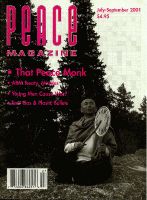
Peace Magazine Jul-Sep 2001, page 30. Some rights reserved.
Search for other articles by Niliema Karkhanis here
Jan Herman Brinks New York: St. Martins, 2000
Herman Brinks's book traces the intersection of ideas in former GDR during its transition from Stalinism to democracy. It explains how seemingly divergent interfaces of power - the post-Hitlerian right versus the Stalinists - have serviced seemingly contradictory convergences of ideological expressions. Despite the anti-fascism attributed to the Communist Party leadership in the former GDR, Brinks shows that this was not always genuine. The GDR leaders' commitment to anti-fascism was often wavering. Many key political figures in the East German party such as Vincenz Muller had been prominent Nazis. Muller, who had been a lieutenant-general in the Wehrmacht and in the succeeding Stalinist regime, had founded the Nationale Volksarmee (NVA) 1956 from units of the Volkspolizei. After the construction of the wall in 1961, "the NVA and the border troops became disciplined instruments for maintaining domestic and foreign order. No means was shunned to achieve this." Contemporary Germany might be seen as a revisitation of Weimar where the Social Democrats "have tried to neutralize the 'pull to the right' among the population by a "pull to the right'" in their own policies. That may be one reason why the German authorities acted only late and tentatively against right-wing radicals. Some critics of this pattern saw a similarity with the Weimar Republic; it reminded them of the coalition between the Reichswehr in the Weimar Republic and the Nazi street-fighters."
Brinks offers chapters on key intellectual and political influences in post-war Germany, including the on-going authoritarian presence of Lutheranism, a chapter on anti-semitism and a chapter on anti-fascism. Also, he analyzes the struggles of particular groups (such as Poles and Asylum-seekers) marginalized by right discourses. He discusses racism toward Turkish people in Germany, where children of immigrants are not automatically given citizenship status, and if granted "asylum," allowed to maintain dual status. But he does not mention the plight of Kurdish people, who are in exile from Turkey and marginalized within Germany.
Reviewed by Niliema Karkhanis, who has been managing editor of Peace Magazine.

Peace Magazine Jul-Sep 2001, page 30. Some rights reserved.
Search for other articles by Niliema Karkhanis here